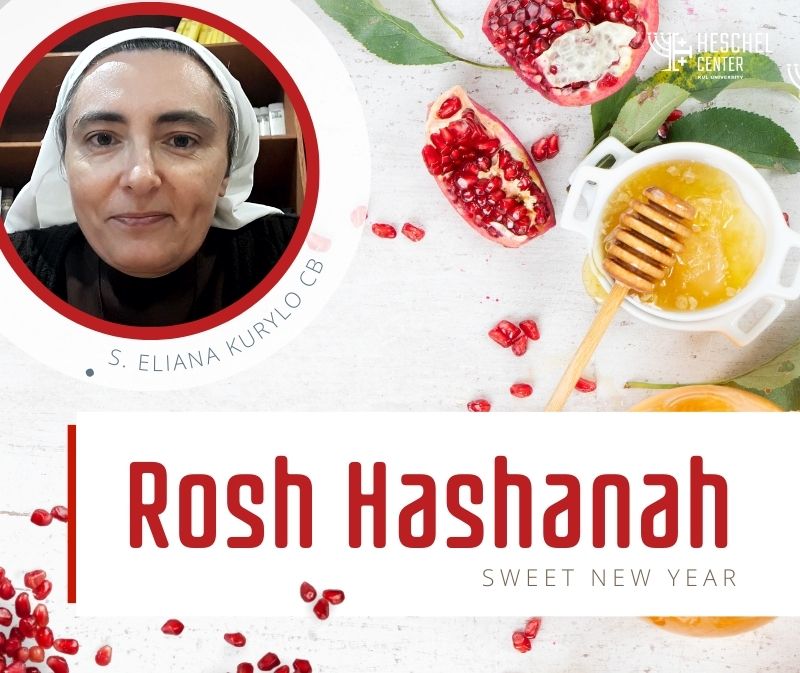Sweet Rosh Hashanah - today begins 5784 on the Jewish calendar
 Rosh Hashanah, which means "head of the year," is the first day of the new Jewish year. Jews on this day dip challah and apples in honey during a celebratory dinner, a metaphor for God's blessing and the desire that the coming year will also be filled with sweetness - On the first day of 5784, Sr. Eliana Kurylo CB, the Superior of the Community of Blessings in Emmaus-Nicopolis, Israel, spoke to the A.J. Heschel Center of the Catholic University of Lublin about the symbolism and traditions of the Jewish New Year. Sr. Kurylo is also a proofreader of ancient Hebrew at the Biblical Institute of Toulouse.
Rosh Hashanah, which means "head of the year," is the first day of the new Jewish year. Jews on this day dip challah and apples in honey during a celebratory dinner, a metaphor for God's blessing and the desire that the coming year will also be filled with sweetness - On the first day of 5784, Sr. Eliana Kurylo CB, the Superior of the Community of Blessings in Emmaus-Nicopolis, Israel, spoke to the A.J. Heschel Center of the Catholic University of Lublin about the symbolism and traditions of the Jewish New Year. Sr. Kurylo is also a proofreader of ancient Hebrew at the Biblical Institute of Toulouse.
Jewish tradition holds that during Rosh Hashanah, God opens the book in heaven and judges each person's deeds from the past year. It lasts ten days until the Day of Atonement on Yom Kippur, so there is time to repent and ask God for forgiveness. These days, God decides who will leave this world in the new year that has just begun, so Jews make their New Year's wishes: "May you be written (in the Book of Life) and sealed for a good year." "The sound of the shofar, or trumpets, during the holiday as well as during the days of repentance that follow is meant to motivate the soul to return to God and help its spiritual revival," says Sr. Eliana Kurylo.
On the afternoon or evening of Rosh Hashanah, Jewish people go to the water for the Tashlich ceremony, symbolically emptying pockets to get rid of personal sins. Disposing of sins in the water where the fish live is also not without significance. "Fish are the few animals that do not close their eyes. They are a symbol of God's eyes, which are open all the time and see all human deeds," explains the superior of the Community of Blessings in Emmaus-Nicopolis, Israel.
An essential part of the Jewish New Year is a festive dinner, during which the food served has symbolic meaning. "On the New Year's table, you will find a round challah showing the continuity of each year and the recurring cyclical nature of the seasons. The challah and apples are dipped in honey, a metaphor for God's blessing and the desire for the coming year to be filled with sweetness. The holiday table also offers dates and pomegranates. "The festive atmosphere fills homes and souls with hope but also calls everyone to turn to God to receive the grace to become what He wants us to be," concludes Sr. Eliana Kurylo CB.
Entire commentary:
Creation and judgement
Rosh Hashanah, literally "head of the year", is the first day of the Jewish new year. In the Bible, it is called Yom Truah, the day of the trumpets. This day commemorates the creation of the world and man but it also remembers God's judgment. According to the Jewish tradition on the day of Rosh Hashanah, God opens the judgement books in heaven and weighs the previous year’s deeds of each one. Everyone's fate will be eventually sealed ten days later on Yom Kippur. For this reason, the time between Rosh Hashanah and Yom Kippur is marked by a deep reflection and repentance and reparation for one’s faults.
New Year’s Wishes
On Rosh Hashana everyone exchanges greetings saying: "Have a good year" (Shana Tova) but also "May we be inscribed (in the Book of Life) for a good year". It is believed that during that time God decides who will leave this world during the year that has just begun. In the days between Rosh Hashanah and Yom Kippur, the wishes take a different form: May you be inscribed (in the Book of Life) and sealed for a good year". The sounds of the shofar, or trumpets, during the holiday prayers and during the following days of penance are here to stimulate the soul and contribute to its spiritual revival.
Tashlikh
In the afternoon or the evening of Rosh Hashanah, there is a custom to go to a river or a natural body of water to participate in a ceremony called Tashlikh, during which pockets are symbolically emptied as a sign of getting rid of personal sins. This tradition comes from the Book of Micah where we read: “You shall cast all their sins into the depths of the sea” (Michah 7,19). The ceremony takes place close the water also because the fish that live in it do not close their eyes, which is a reference to God's eyes that are always open and see all human deeds.
Rosh Hashanah in Talmud
Rav Kruspedai said in the name of Rav Yochanan: Three books are opened [before the Heavenly Tribunal] on Rosh Hashanah – one for the unquestionably wicked, one for the unquestionably righteous and one for those between [these extremes]. The unquestionably righteous are immediately inscribed and sealed for life, the unquestionably wicked are immediately inscribed and sealed for death. [But the judgement of] those between stands abeyance from Rosh Hashanah until Yom Kippur. If they are not found worthy, they are inscribed for death. (Rosh Hashanah 6b).
New Year supper
There is a festive meal on the evening of Rosh Hashana. The dishes that are served have a symbolic meaning related to the holiday. On the New Year's table we will find a round challah showing the continuity of each year and the repetitive nature of the seasons. Challah and apples also found on the table are dipped in honey, which is a metaphor for God's blessing and the desire for the coming year to be filled with sweetness. There are also dates. Their Hebrew meaning can be translated as “the bitterness will end.” Pomegranates with their numerous seeds symbolize the multitude of good deeds that we can accomplish every year. The festive atmosphere fills the homes and souls with hope but it also calls everyone to turn to God in order to receive the grace to be the ones He really wants us to be.
About the author
Sr Eliana Kuryło CB – an English teacher and translator by education, a tutor of ancient Hebrew at the Biblical Institute in Toulouse. She led Bible workshops at the student chaplaincies in New Zealand and Toulouse, France. She has been involved in Jewish-Christian dialogue for many years. She is currently the superior of the sisters at the Community of the Beatitudes in Emmaus-Nicopolis, Israel.
Heschel Center of the Catholic University of Lublin












